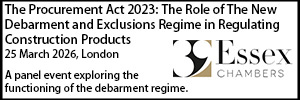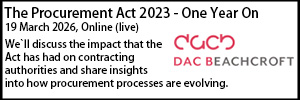Limitation in public contracts challenges
- Details
The High Court has handed down an important judgment, providing extensive guidance on the correct interpretation and application of a number of aspects of the rules governing limitation in respect of challenges to the award of public contracts under the Public Contracts Regulations 2015 (“the PCR”). Joseph Barrett KC examines the ruling.
In Oracle Security Services Limited v Barts Health NHS Trust & Ors [2024] EWHC 1201 (TCC), the Claimant, Oracle, commenced proceedings alleging that the First Defendant (“the Trust”) had effected an unlawful direct award of a public contract by purporting to award and “back date” a call-off contract under a framework contract to a contractor who, in reality, had been directly appointed without a lawful procurement process.
The Defendants applied for summary judgment/strike out of the PCR 2015 claim on the basis that the claims were time-barred because the evidence indicated Oracle had acquired actual or constructive notice of the facts on which the allegations of breach of the PCR 2015 were founded more than 30 days before the claim was commenced.
The Defendants argued that:
(i) Oracle had sent a pre-action letter a number of months before issuing the claim form which, on proper reading, indicated that it had already had knowledge of the facts on which its claim was ultimately based at that date (apparently due to interaction with a purported ‘whistle-blower’).
(ii) Oracle’s solicitors had received, and had read, a detailed pre-action response from the Trust containing information sufficient to start time running for limitation purposes 31 days before the claim was commenced, i.e the claim form was issued 1 day late. Oracle’s legal advisers had miscalculated the applicable limitation period by erroneously assuming that the day on which knowledge was acquired was not counted as part of the calculation of the 30 day statutory limitation period, with the effect that the claim was issued one day outside of the limitation period.
Oracle advanced very wide-ranging legal arguments regarding the meaning and effect of the limitation provisions in the PCR 2015 and the Remedies Directive in order to seek to avoid the summary determination of its claim. Consequently, the Court’s judgment provides valuable guidance on a number of points regarding the interpretation and application of the limitation provisions of the PCR 2015. In particular, the High Court held that:
(1) In calculating the 30 day limitation period for the purposes of the PCR 2015, the day on which knowledge is first acquired counts as day one of the relevant period, i.e. day 1 is not discounted on the basis of the application of the so called ‘faction of a day’ principle.
(2) For the purpose of applying the PCR 2015 limitation period, a solicitor conducting litigation on behalf of their client is acting as agent on behalf of their client, and therefore the client will be fixed with the knowledge of their solicitor for the purposes of litigation from the date the solicitor acquires the relevant knowledge.
(3) Reg. 92(3)(c) of the PCR 2015, on its proper construction, may apply to decisions outside the context of a regulated procurement competition. However, the level of information that must be provided to satisfy the requirement of publication is modest.
The judgment will be of considerable interest, and importance, for those litigating public contracts challenges.
Joseph Barrett KC of 11KBW appeared on behalf of the Defendants, instructed by Bevan Brittan and Browne Jacobson. The Claimant was represented by Peter Knox KC. 11KBW will shortly deliver a webinar on the judgment. Please contact
Sponsored articles
Walker Morris supports Tower Hamlets Council in first known Remediation Contribution Order application issued by local authority
Unlocking legal talent
Legal Director - Government and Public Sector
Commercial Lawyer
Locums
Poll
15-07-2026 11:00 am


















































